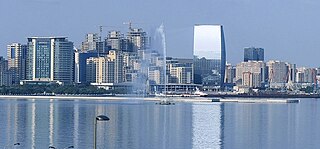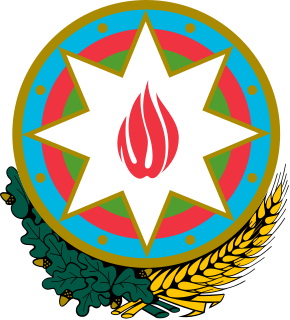
Azerbaijan, officially the Republic of Azerbaijan, is a country located at the boundary of Eastern Europe and Western Asia. It is a part of the South Caucasus region, and is bounded by the Caspian Sea to the east, Russia to the north, Georgia to the northwest, Armenia and Turkey to the west, and Iran to the south. Baku is the capital and largest city.

The economy of Azerbaijan has completed its post-Soviet transition into a major oil-based economy, from one where the state played the major role. The transition to oil production led to remarkable growth figures as projects came online; reaching 26.4% in 2005 and 34.6% in 2006 before subsiding to 10.8% and 9.3% in 2008 and 2009 respectively. The real GDP growth rate for 2011 was expected at 3.7% but had dropped to 0.1%. Large oil reserves are a major contributor to Azerbaijan's economy. The national currency, the Azerbaijani manat, was stable in 2000, depreciating 3.8% against the dollar. The budget deficit equaled 1.3% of GDP in 2000.

The Republic of Azerbaijan is a member of the United Nations, the Non-Aligned Movement, the Organization for Security and Cooperation in Europe, NATO's Partnership for Peace, the Euro-Atlantic Partnership Council, the World Health Organization, the European Bank for Reconstruction and Development; the Council of Europe, CFE Treaty, the Community of Democracies; the International Monetary Fund; and the World Bank.

Heydar Alirza oglu Aliyev was a Soviet and Azerbaijani politician who served as the third President of Azerbaijan from October 1993 to October 2003. Originally a high-ranking official in the KGB of the Azerbaijan SSR, serving for 28 years in Soviet state security organs (1941–1969), he led Soviet Azerbaijan from 1969 to 1982 and held the post of First Deputy Premier of the Soviet Union from 1982 to 1987.

Azerbaijan, officially the Azerbaijan Soviet Socialist Republic, also referred to as Soviet Azerbaijan, was one of the constituent republics of the Soviet Union between 1922 and 1991. Created on 28 April 1920 when the Russian Soviet Federative Socialist Republic brought pro-Soviet figures to power in the region, the first two years of the Azerbaijani SSR were as an independent country until incorporation into the Transcausasian SFSR, along with the Armenian SSR and the Georgian SSR.

Azerbaijanis or Azeris, also known as Azerbaijani Turks, are a Turkic people living mainly in Northwestern Iran and in the sovereign Republic of Azerbaijan, with a mixed cultural heritage, including Caucasian, Iranian and Turkic elements. They are the second-most numerous ethnic group among the Turkic-speaking peoples after Turkish people and are predominantly Shia Muslims. They comprise the largest ethnic group in the Republic of Azerbaijan and the second-largest ethnic group in neighboring Iran and Georgia. They speak the Azerbaijani language, belonging to the Oghuz branch of the Turkic languages.

Artsakh, officially the Republic of Artsakh, formerly the Nagorno-Karabakh Republic, NKR, is a breakaway state in the South Caucasus supported by Armenia, whose territory is internationally recognized as part of Azerbaijan. Artsakh controls a part of the former Nagorno-Karabakh Autonomous Oblast, including the capital of Stepanakert. It is an enclave within Azerbaijan. Its only overland access route to Armenia is via the 5 km (3.1 mi) wide Lachin corridor which is under the control of Russian peacekeepers.

Shusha or Shushi is a city in Azerbaijan, in the disputed region of Nagorno-Karabakh. Situated at an altitude of 1,400–1,800 metres in the Karabakh mountains, the city was a mountain resort in the Soviet era.

Kalbajar District is one of the 66 districts of Azerbaijan. It is located in the west of the country and belongs to the Eastern Zangezur Economic Region. The district borders the districts of Lachin, Khojaly, Agdam, Tartar, Goranboy, Goygol and Dashkasan districts of Azerbaijan, as well as the Gegharkunik and Vayots Dzor provinces of Armenia. Its capital and largest city is Kalbajar. As of 2020, the district had a nominal population of 94,100.

The First Nagorno-Karabakh War was an ethnic and territorial conflict that took place from February 1988 to May 1994, in the enclave of Nagorno-Karabakh in southwestern Azerbaijan, between the majority ethnic Armenians of Nagorno-Karabakh backed by Armenia, and the Republic of Azerbaijan. As the war progressed, Armenia and Azerbaijan, both former Soviet Republics, entangled themselves in protracted, undeclared mountain warfare in the mountainous heights of Karabakh as Azerbaijan attempted to curb the secessionist movement in Nagorno-Karabakh. The enclave's parliament had voted in favor of uniting itself with Armenia and a referendum, boycotted by the Azerbaijani population of Nagorno-Karabakh, was held, whereby a majority voted in favor of independence. The demand to unify with Armenia began in a relatively peaceful manner in 1988; in the following months, as the Soviet Union disintegrated, it gradually grew into an increasingly violent conflict between Armenians and Azerbaijanis, resulting in ethnic cleansing, with the Sumgait (1988) and Baku (1990) pogroms directed against Armenians, and the Gugark pogrom (1988) and Khojaly Massacre (1992) directed against Azerbaijanis being notable examples. Inter-ethnic clashes between the two broke out shortly after the parliament of the Nagorno-Karabakh Autonomous Oblast (NKAO) in Azerbaijan voted to unify the region with Armenia on 20 February 1988. The declaration of secession from Azerbaijan was the final result of a territorial conflict regarding the land. As Azerbaijan declared its independence from the Soviet Union and removed the powers held by the enclave's government, the Armenian majority voted to secede from Azerbaijan and in the process proclaimed the unrecognized Republic of Nagorno-Karabakh.

The Nagorno-Karabakh conflict is an ethnic and territorial conflict between Armenia and Azerbaijan over the disputed region of Nagorno-Karabakh, inhabited mostly by ethnic Armenians, and seven surrounding districts, inhabited mostly by Azerbaijanis until their evacuation in the First Nagorno-Karabakh War. Some of these territories are de facto controlled, and some are claimed by the breakaway Republic of Artsakh although they have been de jure internationally recognized as part of Azerbaijan. The conflict has its origins in the early 20th century, but the present conflict began in 1988, when the Karabakh Armenians demanded transferring Karabakh from Soviet Azerbaijan to Soviet Armenia. The conflict escalated into a full-scale war in the early 1990s which later transformed into a low-intensity conflict until four-day escalation in April 2016 and then into another full-scale war in 2020.

International organizations have frequently alleged that Azerbaijan has violated human rights standards established in international law. Human Rights Watch issued a 2013 report accusing Azerbaijan of imprisoning and harassing political activists and human rights defenders. In 2019, Human Rights Watch called the situation of human rights in Azerbaijan "appalling", citing "rigid control" by the government, "severely curtailing freedoms of association, expression, and assembly", as well as "torture and ill-treatment" of journalists, lawyers, and opposition activists. According to Reporters without Borders, Azerbaijan ranks 168 of 180 countries on the Press Freedom Index. A 2020 report by the U.S. State Department accused Azerbaijan of a wide variety of human rights abuses, including "unlawful or arbitrary killing", "heavy restrictions on free expression, the press, and the internet", and "the worst forms of child labor".

Azerbaijan National Academy of Sciences (ANAS), located in Baku, is the main state research organization and the primary body that conducts research and coordinates activities in the fields of science and social sciences in Azerbaijan. It was established on 23 January 1945.
Azerbaijani Americans are Americans of the Azerbaijani ancestry from the Republic of Azerbaijan and Iranian Azerbaijan or people possessing Azerbaijani, Iranian, and/or American citizenship. Most Azerbaijani Americans have immigrated to the United States from Azerbaijan, Iran, Germany, Georgia, Russia, Turkey and Ukraine.
İctimai Television, or İTV, is a public television channel in Azerbaijan. It officially began broadcasting on 29 August 2005 after being created by law in 2004, as the first independent public broadcaster in Azerbaijan. The channel is based in Baku.

Ilham Heydar oghlu Aliyev is the fourth president of Azerbaijan, serving in the post since 31 October 2003.

Azerbaijani nationality law is a nationality law which determines who is a citizen of Azerbaijan.
The Azerbaijani diaspora are the communities of Azerbaijanis living outside the places of their ethnic origin: Azerbaijan and the Iranian region of Azerbaijan.

Visitors to Azerbaijan must obtain a visa from one of the Azerbaijani diplomatic missions, unless they come from one of the visa exempt countries, countries eligible for visa on arrival or countries eligible for electronic visa. Visitors must hold passports that are valid for at least 3 months beyond the intended period of stay.

The 2020 Nagorno-Karabakh war was an armed conflict in the disputed region of Nagorno-Karabakh and the surrounding territories. The main combatants were Azerbaijan, with support from Turkey and foreign mercenary groups, on one side and the self-proclaimed Republic of Artsakh and Armenia on the other side. It was the latest escalation of an unresolved conflict over the region, which was annexed to Azerbaijan during the Soviet era and internationally recognized as part of Azerbaijan, but partially governed by Artsakh, a breakaway state with an Armenian ethnic majority. The 2020 war was a major escalation of the Nagorno-Karabakh conflict which takes its origins in the early 20th century.















